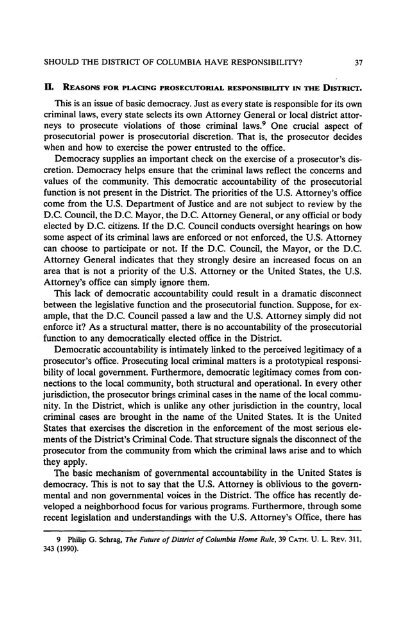Download Electronic Version - UDC Law Review
Download Electronic Version - UDC Law Review
Download Electronic Version - UDC Law Review
Create successful ePaper yourself
Turn your PDF publications into a flip-book with our unique Google optimized e-Paper software.
SHOULD THE DISTRICT OF COLUMBIA HAVE RESPONSIBILITY? 37<br />
U. REASONS FOR PLACING PROSECUTORIAL RESPONSIBILITY IN THE DISTRlcr.<br />
This is an issue of basic democracy. Just as every state is responsible for its own<br />
criminal laws, every state selects its own Attorney General or local district attorneys<br />
to prosecute violations of those criminal laws. 9 One crucial aspect of<br />
prosecutorial power is prosecutorial discretion. That is, the prosecutor decides<br />
when and how to exercise the power entrusted to the office.<br />
Democracy supplies an important check on the exercise of a prosecutor's discretion.<br />
Democracy helps ensure that the criminal laws reflect the concerns and<br />
values of the community. This democratic accountability of the prosecutorial<br />
function is not present in the District. The priorities of the U.S. Attorney's office<br />
come from the U.S. Department of Justice and are not subject to review by the<br />
D.C. Council, the D.C. Mayor, the D.C. Attorney General, or any official or body<br />
elected by D.C. citizens. If the D.C. Council conducts oversight hearings on how<br />
some aspect of its criminal laws are enforced or not enforced, the U.S. Attorney<br />
can choose to participate or not. If the D.C. Council, the Mayor, or the D.C.<br />
Attorney General indicates that they strongly desire an increased focus on an<br />
area that is not a priority of the U.S. Attorney or the United States, the U.S.<br />
Attorney's office can simply ignore them.<br />
This lack of democratic accountability could result in a dramatic disconnect<br />
between the legislative function and the prosecutorial function. Suppose, for example,<br />
that the D.C. Council passed a law and the U.S. Attorney simply did not<br />
enforce it? As a structural matter, there is no accountability of the prosecutorial<br />
function to any democratically elected office in the District.<br />
Democratic accountability is intimately linked to the perceived legitimacy of a<br />
prosecutor's office. Prosecuting local criminal matters is a prototypical responsibility<br />
of local government. Furthermore, democratic legitimacy comes from connections<br />
to the local community, both structural and operational. In every other<br />
jurisdiction, the prosecutor brings criminal cases in the name of the local community.<br />
In the District, which is unlike any other jurisdiction in the country, local<br />
criminal cases are brought in the name of the United States. It is the United<br />
States that exercises the discretion in the enforcement of the most serious elements<br />
of the District's Criminal Code. That structure signals the disconnect of the<br />
prosecutor from the community from which the criminal laws arise and to which<br />
they apply.<br />
The basic mechanism of governmental accountability in the United States is<br />
democracy. This is not to say that the U.S. Attorney is oblivious to the governmental<br />
and non governmental voices in the District. The office has recently developed<br />
a neighborhood focus for various programs. Furthermore, through some<br />
recent legislation and understandings with the U.S. Attorney's Office, there has<br />
9 Philip O. Schrag, The Future of District of Columbia Home Rule, 39 CATH. U. L. REV. 311,<br />
343 (1990).














